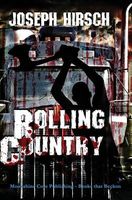Scott's Note: Joseph Hirsch contributes a piece today. Hirsch has a new book out called The Bastard's Grimoire, a book I enjoyed and blurbed, describing it as something akin to a Middle Ages set Terry Gilliam film with an NC-17 rating. Since his first novel came out in 2013, Hirsch has been prolific; he has 10 books published all together. He has worked in a number of genres so I asked him to write about precisely that: what prompts him with each book he does to write in a difference genre or meld of genres?
Here's his answer.
Wyatting Past the Graveyard
by Joseph Hirsch
Every writer has their strengths and
weaknesses. If I had to pinpoint my major weaknesses, they would be a tendency
toward what the writer John Sheppard once (accurately) called overly-elaborate sentence
construction, or what the writer Lori Fraser (also accurately) referred to as my descriptive powers that sometimes
reduce readability. I think it was Ben Bova who once said a writer has two options, to either have a reader admire their words or believe their stories.
There are some writers for whom the
admiration of their words is bound to the believability of the story (one
doesn’t so much read H.P. Lovecraft as admire the impenetrable paragraphs he
constructed with a near-saurian disregard for what the reader thought).
I personally think that the style a writer
uses should be contingent upon the task at hand. Different genres call for
different levels of ornamentation. Gothic horror gives one a chance to lard on
the descriptions of putrescent moss and cracked fissures in cenotaphs, while a
noir novel calls for a more minimalist approach. If I’ve made a mistake in the
past (and I have), it’s that I used a scalpel where a chainsaw would have
better suited my purposes, and vice versa. There are those who like my crime
output, especially my novel Rolling
Country, but I have mixed feelings about the book. The crime maestro Elmore
Leonard once said, “After I write something, I read it, and if it looks like
writing, I rewrite it.” I personally like my writing to look like writing, and
so my forays in the crime genre have been few and far between, or have been
slipstream affairs that meld crime fiction with other, bizarre elements.
Another one of my weaknesses is too much
(hat-tip to John Sheppard, again) “table-setting.” I can go a full act or two
without introducing much conflict, and then turn on the afterburners in the
final stanzas of the third act. Some readers find this unconventional arc
gratifying; others are flustered or confused by it.
Getting to what I think are my primary
assets, I would enumerate two:
1). I rarely repeat myself, or allow
myself to be reduced to formulaic writing. I have written tales about
nano-sized robots who force a pizza deliveryman to place his pubic hairs on
pepperonis in the pizza shop where he works, so that the little machines can
monitor humans from inside of their digestive systems to determine whether or
not our species deserves to be exterminated; I have also written a tale about a heroin
addict who goes to Afghanistan and makes some sort of Faustian pact with a
reclusive Middle-Eastern billionaire, which turns his blood into a drug; I’ve
written a straightforward crime foray about an over-the-road trucker who
kidnaps a young prostitute, and I wrote a book about how Satan himself was
nestled in a bed of ice beneath the Appalachian Mountains. I’ve written weird
Westerns that involve cannibals, or trackers blessed with super-sensitive noses
that can scent out fugitives and menstruating vaginas with equal ease. My latest
novel, The Bastard’s Grimoire, is a
fantasy tale set in a German High Middle Ages in which a wizard reads the
biblical passage about “be fruitful and multiply” to a young man, in inverted
Latin, which causes the lad to bring a monster into the world every time he
copulates with a woman.
I do not have the weakness or problem
usually ascribed to Chuck Palahniuk or Kurt Vonnegut (both of whom, I should
add at this point, are probably better writers than me and are more successful
than I will ever be). I have worked in every genre, not with any sort of
overarching conscious plan, but because to do otherwise than to transplant my
skillset from one area to another would be boring. “Talent is transplantable”
as Richard Price once said, before going on to write the same novel over and
over again (after Clockers, which was
a masterpiece), before he became a successful TV writer whose return to the
game was a pseudonymously penned lackluster affair called The Whites, written as Richard Price writing as Harry Brandt (what
the fuck?), but I digress.
People who like my weird westerns and my
crime novels (or my latest fantasy novel), who expect me to churn out the same
book over and over again for their satisfaction should heed the words of the
rapper Jay-Z: “Niggas want my old shit, buy my old album.”
All writers, I think, smart from
criticism, especially in our internet age, when the time between “farm and
fork” so to speak is pretty rapid, compared to in the nineteenth century or in
the first half of the twentieth century. Melville and Fitzgerald both had to
wait months or even years between the writing and the publication of their
works, before an ungrateful or indifferent public responded to their books. We
in the 21st century have Goodreads and Amazon.com, both of which
I’ve stopped checking for reviews of my works.
I recently read a book about the internet
that quoted a study in which it was observed that the neurological response to
hurtful comments about oneself online mimics the effects of gripping a scalding
cup of coffee. I know better ways to hurt myself than to constantly check the
reviews and ratings for my books online. I’ve got a root canal and a lidocaine
injection slated for this upcoming week, and if I’m feeling really frisky,
maybe I’ll slam my dick in the car door, which brings me to my second, and most
important asset as a writer:
2) I am insane. If one were to offer me
the blandishments of Hollywood, cocaine, beautiful women, a mansion, fame,
etc., if I would only allow myself to be reduced to a formula (or to writing
screenplays), I would not take the bait. I would prefer to stay in my rented
house with the worn vinyl siding, listening to ambient music on my stock
computer speakers, and typing like I am right now, with my dog lying behind me
on the bed where a woman hasn’t lain for some time.
This is what I was born to do. During my
last two years in the Army, I told myself I wanted to be a professional writer.
After I got back from Iraq I started submitting stories to various magazines
and while I did get some rejections ranging from the indifferent to the
mean-spirited, I also eventually broke that door down/ dug through that prison
wall with a spoon (choose your metaphor). I eventually had something like eight
or nine books published. I am not bragging. I had no choice; I still don’t.
I think that, even if I wanted to sell
out, I wouldn’t know how. The progressive rock musician Robert Wyatt (former
drummer of The Soft Machine) is so
confounding in his approach to music that there is a neologism coined to
describe driving people crazy by playing his solo work on jukeboxes in pubs in
England. They call it “Wyatting.” (sic)
In Wyatt’s biography, Different Every Time, Robert was asked about the term and found it
somewhat amusing, replying with a chuckle that he never set out to be prog or
experimental in his music, that his real role model was Ray Charles. Wyatt said
he always strove to make pop music, but it always came out strange in spite of
his designs to sounds mainstream. I have the same problem.
But then again, the dichotomy of
“strength” / “weakness” might be a moot one, if the reader remembers that old
quote by Jean Cocteau: “What the public criticizes in you, cultivate. It is
you.”
With that in mind, let me get back to
writing my hardboiled PI novel about a loquacious gumshoe prone to logorrhea
tasked with monitoring the priapic doings of a husband who has foregone his
connubial vows to his betrothed and now partakes in myriad extramarital
dalliances.
That last sentence probably made Elmore
Leonard do a three-sixty in his grave, and rightly so. I can’t write crime /
hardboiled / pulp for shit.
The Bastard's Grimoire is available at Amazon right here.




2 comments:
I read ROLLING COUNTRY in a (mostly) single sitting or at least within 24 hours. Joseph Hirsch is ridiculously talented and I hate him.
I just started reading him with GRIMOIRE. The talent is obvious. Lots more to read and maybe ROLLING COUNTRY next.
Post a Comment